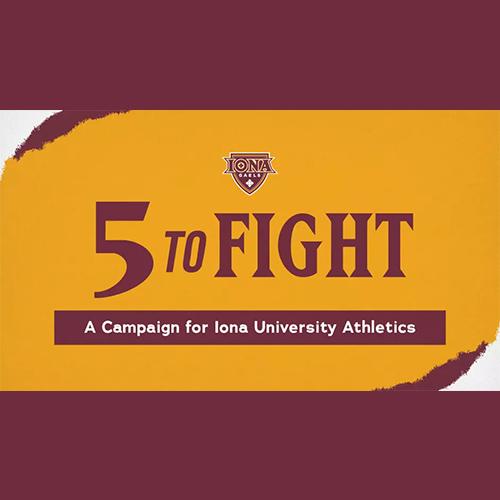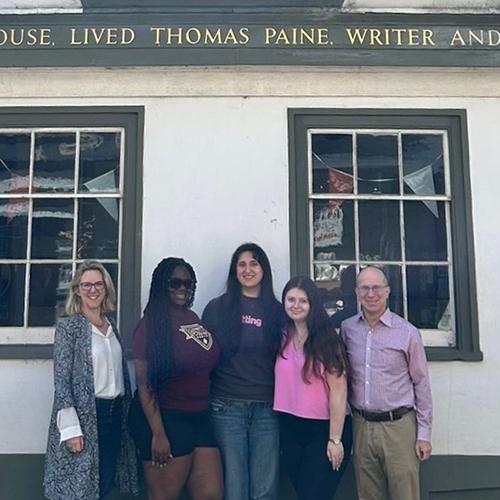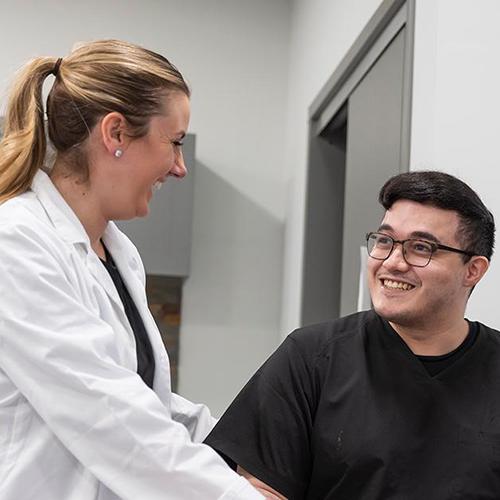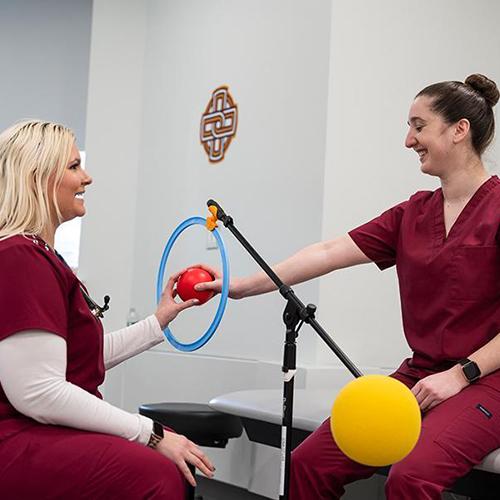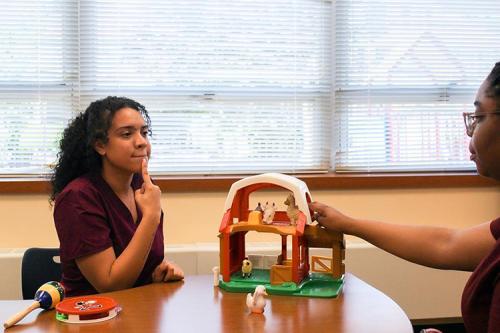What Allied Health Careers Are in Demand?
Allied health professions cover a variety of non-medicine and non-nursing health careers and are a vital part of our health care system. The allied health field encompasses health care professionals as varied as physical therapists, occupational therapists, audiologists, speech therapists, radiology technicians and medical technicians, just to name a few. In addition, there are a variety of health care-related careers like social work, psychology and counseling that are often informally considered part of this expansive category. Many allied health professions are centered on patient interaction, making this work often very rewarding as clinicians strive to change patients’ lives for the better every day.
A variety of health professions will rise in demand over the next decade according to the Bureau of Labor Statistics, requiring more professionals to join these fields. This increased need for health care workers of all types will lead to competitive salaries and stronger job security overall. Two allied health professions that will be particularly in demand in the next decade are occupational therapy and communications sciences and disorders, which include speech pathology. Both of these programs are offered at Iona University.
Educational Requirements for an Allied Health Career
Many allied health careers require a combination of education and licensure to be eligible to practice in that profession. Most of the more in-demand allied health careers require a master’s degree or other advanced training. For example, to become an Occupational Therapist, you would need to earn your Master of Science in Occupational Therapy, which includes months of clinical experience, and then pass the licensure exam. This process is similar for becoming a practicing Speech Language Pathologist (SLP).
Fieldwork and Practicum Training
Allied health master’s programs incorporate a combination of classroom-based learning and practical hands-on experience to build expertise. Practicums and clinical experiences offer the opportunity to apply the growing knowledge and skills in a health care setting, often with actual patients/clients involved. This part of your education is important because much of an allied health professional’s day involves clinical judgment and being mentally prepared for a fast-paced environment.
Allied health degree programs that offer a variety of fieldwork experiences are particularly valuable because graduate students have the opportunity to work with multiple types of patients/clients with varying conditions and challenges. Depending on the program, students may have the opportunity to complete fieldwork in a teaching hospital, clinic, long-term care facility or school. If a student wants to work with a particular population, like children or the elderly, it is worthwhile to find a program that offers or can accommodate those specific fieldwork experiences.
In addition, it is important to consider where these opportunities are located; many programs feature convenient on-campus labs or clinics where you can complete fieldwork requirements or have service-learning opportunities. Having rich and varied fieldwork experiences is crucial for emerging allied health professionals as they embark on the first stages of their career.
Skills Necessary for Success In Allied Health
In addition to specialized technical expertise, allied health professionals need to possess strong interpersonal skills because of their interaction with patients/clients and their work on multidisciplinary health care teams. These conditions can often be emotionally tense, take place in emergency circumstances and under strict time constraints.
Additionally, our current health care system often demands detailed documentation for medical records and health insurance requirements so organizational skills and efficient written and oral communication abilities are also great assets.
Why Pursue a Career in Occupational Therapy?
Occupational therapy is a rewarding allied health career where therapists work with clients to build or rehabilitate skills for everyday activities. Occupational therapists, or OTs, work in a variety of settings, including hospitals, outpatient clinics, schools and skilled nursing facilities.
To join this fulfilling allied health profession, occupational therapy students typically complete a two to three year master’s program that includes fieldwork. Then, in order to practice as an OT, they must successfully meet their state licensure requirements, including passing the National Board for Certification in Occupational Therapy (NBCOT) Certification Examination.
There are many technical skills that a successful OT has under their belt, including:
- a working knowledge of anatomy, human movement, neuroscience and mental health conditions;
- applying OT frameworks and new research to clients in real clinical settings;
- assessing a client for OT services, mobility aids and other assistive technology;
- strong communication and observation skills to address the specific needs of pediatric and geratric clients as well as people with disabilities and or mental health conditions;
- writing reports on client progress for medical and insurance records.
According to the Bureau of Labor Statistics, roles for occupational therapists are expected to grow 14 percent between 2021-2031, much faster than average. The median salary for an OT in 2021 was $85,570.
Why Pursue a Career in Communication Sciences and Disorders?
A Master’s in Communication Sciences and Disorders leads to multiple allied health careers including speech-language pathology and audiology. These career paths support and diagnose patients with communicative, swallowing and hearing disorders, with the objective of giving them strategies and solutions to interact effectively with the world.
To pursue one of these speech and hearing allied health careers, students typically pursue an accredited Master’s in Communication Sciences and Disorders. Then they have to meet the fieldwork and credentialing requirements to apply for state licensure.
As a successful allied health professional in communication sciences, there are a variety of necessary technical skills that must be built:
- diagnosis and treatment of communication, hearing and swallowing disorders;
- working knowledge of neuroanatomy, physiology and speech development;
- applying theoretical knowledge and new research to real patients;
- working with patients across the lifespan by utilizing strong communication skills and adapting treatment to developmental stages;
- efficient communication abilities to compile reports on patient progress for medical and insurance records.
According to the Bureau of Labor Statistics, the median salary for a speech-language pathologist is $79,060, and this in-demand allied health career is predicted to grow 21 percent from 2021 to 2031. The median salary for an audiologist is $78,950, according to the Bureau of Labor Statistics. Audiologist roles are predicted to grow 10 percent from 2021 to 2031.
Allied Health Programs at Iona University
The NewYork-Presbyterian Iona School of Nursing & Health Sciences offers graduate programs designed for future or current allied health professionals, including a Master of Science in Occupational Therapy or a Master of Arts in Communication Sciences and Disorders.
Our two accredited master’s degree programs explore technological innovation alongside their specific area of allied health and also offer extensive hands-on learning opportunities for students to engage with actual patients/clients. In the modern health care industry, it is crucial that emerging professionals are familiar with electronic medical records, new assistive devices for people with disabilities and how to help patients utilize technology in their daily lives.
Our students benefit from small class sizes which provides many enriching faculty mentorship opportunities. Faculty in both Iona programs include clinicians with decades of clinical insights to share and researchers who are committed to a more equitable and innovative future in allied health care services.
In addition, Iona students in these programs have abundant experiential opportunities, including clinical experiences at NewYork-Presbyterian Hospital, Iona’s fully-equipped OT Lab and Iona’s Speech, Language and Hearing Clinic. In addition, students have a variety of service-learning opportunities that connect them with Iona’s and New Rochelle’s communities, extending their hands-on experiences beyond typical fieldwork.
Prepare to Become an Allied Health Professional at Iona
Iona University is the perfect place to begin your allied health career in occupational therapy or the communication sciences field, which encompasses speech-language pathology and audiology. Our graduate students emerge from their programs confident in their abilities as aspiring allied professionals and fully equipped to pursue licensure.
Request information to learn more about Iona’s graduate programs that connect our students to in-demand and rewarding careers as allied health professionals.
